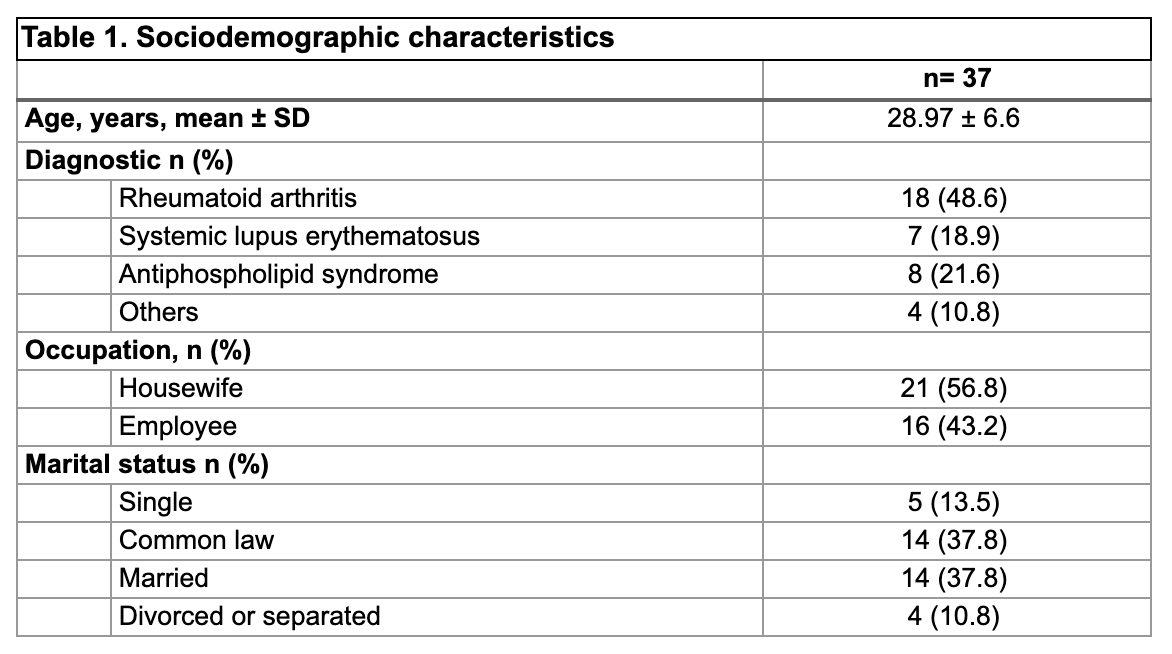Session Information
Session Type: Poster Session B
Session Time: 10:30AM-12:30PM
Background/Purpose: Social determinants of health (SDH) are the conditions in which individuals are born, grow, live and work. These factors (education, socioeconomic status, access to healthcare, nutrition, food security, mental health, family support, and exposure to violence) have an impact on population health. In pregnant women with autoimmune rheumatic diseases (ARDs), SDH may influence maternal and neonatal outcomes, contributing to adverse perinatal outcomes (APOs), reduced quality of life and increased healthcare vulnerability. However, data in this population remain limited. This study aimed to describe SDH in pregnant women with ARDs and examine their association with APOs.
Methods: We conducted an observational, descriptive, cross-sectional study among pregnant women with ARDs attending a rheumatology clinic between 2023 and 2024. Thirty-seven patients completed structured interviews with a social worker. Gestational BMI and dietary quality were obtained from nutrition notes. ARD diagnoses and APOs were extracted from medical records. A psychologist evaluated domestic violence using the HITS scale (cutoff ≥5) and anxiety using the State-Trait Anxiety Inventory (STAI), classifying anxiety as low (< 30), moderate (30–44), or high ( >44). Associations were analyzed using Student’s t-test and chi-square tests.
Results: A total of 37 pregnant women with ARDs were included with a mean age of 28.97 ± 6.6 years. Rheumatoid arthritis was the most frequent diagnosis (48.6%), followed by antiphospholipid syndrome (21.6%), and systemic lupus erythematosus (18.9%). Most were housewives (56.8%), with 37.8% married and another 37.8% living in a common-law (Table 1).
Adverse perinatal outcomes (APOs) were recorded in 20 patients (54.1%). Maternal complications included hypertensive disorders, metabolic disturbances (e.g., anemia, diabetes), and pregnancy terminations due to maternal or fetal indications. Neonatal complications included three perinatal deaths and two cases of neonatal intensive care unit admission.
Low socioeconomic status was significantly associated with adverse perinatal outcomes (APOs) (p = 0.035), with 70% of affected women in this group. Those with APOs showed trends toward lower gestational BMI (25.17 vs. 29.21; p = 0.085) and larger household size (mean 4.35 vs. 3.5; p = 0.167). No significant associations were found for education, food expenses, support networks, medical services, domestic violence, or anxiety levels (Table 2). Notably, most participants experienced moderate-to-high anxiety levels (75.7% for trait, 78.4% for state), and over one-third (32.4%) screened positive for violence during pregnancy.
Conclusion: Addressing SDH with a multidisciplinary approach that incorporates social and psychological factors is vital for improving perinatal outcomes in pregnant women with ARDs. Socioeconomic status significantly impacts maternal-fetal health and must be integrated into rheumatologic care to reduce disparities and improve overall outcomes.
To cite this abstract in AMA style:
Ortiz-Rios A, Arevalo-Nieto F, Avalos-Garcia B, Ponce-Santillan M, Corral-Trujillo M, Ayala-Garcia T, Perez-Garfias D, Ramirez-Cantu D, Tapia-Aguayo L, Ortiz-Palafox J, Galindo-Calvillo E, Dominguez-Chapa E, Perez-Barbosa L, Galarza-Delgado D, Skinner-Taylor C. Social Determinants of Health and Adverse Perinatal Outcomes in Women with Rheumatic Diseases [abstract]. Arthritis Rheumatol. 2025; 77 (suppl 9). https://acrabstracts.org/abstract/social-determinants-of-health-and-adverse-perinatal-outcomes-in-women-with-rheumatic-diseases/. Accessed .« Back to ACR Convergence 2025
ACR Meeting Abstracts - https://acrabstracts.org/abstract/social-determinants-of-health-and-adverse-perinatal-outcomes-in-women-with-rheumatic-diseases/


.jpg)